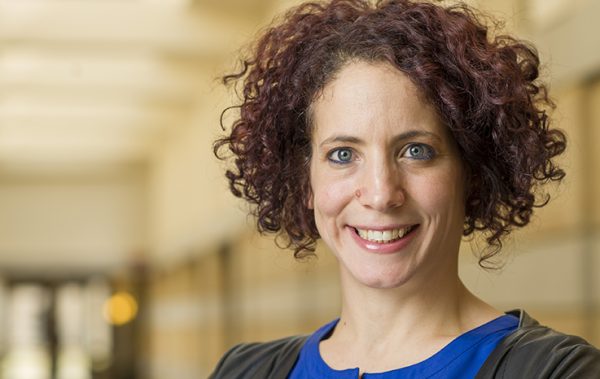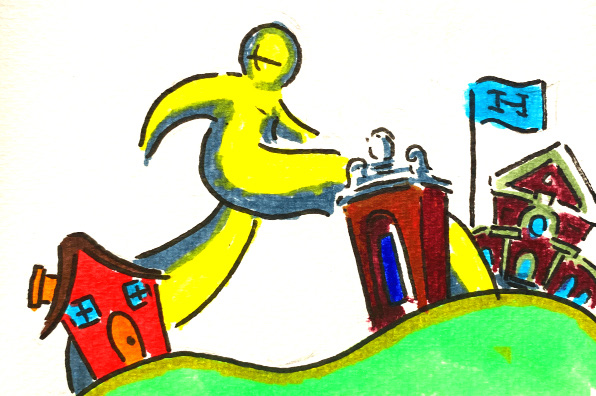Dr. Atalia Omer is a professor of religion, conflict, and peace studies at the Keough School of Global Affairs at the University of Notre Dame, a Senior Fellow at Harvard Divinity School, and the T.J. Dermot Dunphy Professor of Religion, Violence, and Peacebuilding at Harvard University. Dr. Omer specializes in justice, religion, nationalism, and the Israeli-Palestinian conflict. She received an Andrew Carnegie Fellowship in 2017. In this issue, Editor-in-Chief Petr Berlizov interviewed Dr. Omer to gain her perspective on current events in Israel and Gaza. The views expressed by Dr. Omer in this article are her own and do not necessarily reflect the opinion of Berlizov, The Record Board, or The Hotchkiss School.
Petr Berlizov: We’ve been seeing across the country, at universities and schools, backlash to any kind of response to the current war—be it pro-Israel, pro-Palestine, or even pro-human rights. What would you say is a good way for a school or university to respond to the siutaton in Gaza at the moment?
Atalia Omer: The key issue is to challenge, interrogate, and unsettle the narrative that is constructing everything in such binaries, and center everyone’s humanity.
There cannot be a narrative that can only learn and grieve the life of one group of people. That’s why you must have a human rights-centric approach.
This includes recognizing everyone’s humanity, political aspirations, human rights claims, and history.
It’s possible to be pro-Israeli and pro-Palestinian at the same time.
I would say that a good and thoughtful approach is one that centers human rights, international norms and law, along with humanitarian norms and law. Any analysis of the conflict needs to be attentive to context. The Secretary General of the United Nations was attacked for [referencing historical context in his official statement], and it took him a couple to even get to that point.
Of course, we must start with the people who were massacred, burnt, and decapitated on October 7—the Israeli and Jewish people. Two hundred thirty-nine is the latest number [of people kidnapped by Hamas during the attacks], because they’re still trying to identify bodies.
Also, in the kibbutzim and other places that Hamas attacked, there were many people who were not Jewish, for instance, labor workers from Thailand. They’re forgotten in the various narratives, which is baffling.
[The Hamas attacks] did not happen in a vacuum, but that does not justify what happened on October 7. One violation of international law doesn’t justify another violation.
However, it’s not unreasonable to note that Gaza and the people of Gaza have been under siege for 17 years. There had been a military occupation for 56 years. Most of the population of Gaza are refugees from 1948 from the Nakba [mass deportations of Palestinians from Israel], what the Palestinians call the catastrophe of ’48, which involved massive depopulation, displacement, and the creation of a refugee crisis.
Nothing ever justifies turning off water, fuel, electricity [for civilians, as Israel is currently doing in Gaza]. The sheer fact that one party in the supposed conflict has the ability to do so reveals to you the realities of structural forms of violence.
Reconciliation is extremely difficult in a context where political leaders like [President] Joe Biden and [Secretary of State] Antony Blinken stick to their rhetoric, which echoes the rhetoric of [Israeli Prime Minister] Benjamin Netanyahu. This abstracts from the actual concrete realities of violence and the Palestinian experience of the occupation and the siege.
A troubling component is the rise in anti-Palestinian (Berlizov’s note: Omer specifically emphasized it was anti-Palestinian, as opposed to anti-Hamas) rhetoric. Biden echoed [this type of rhetoric] also when he told Netanyahu that October 7 was his September 11. Those kinds of references that make it into a “clash of civilizations” (Berlizov’s note: in this, Omer is referring to the misconstrued “Jews vs. Arabs” narrative, which misunderstands the nature of the conflict (as cultural, not political), and propagates anti-semitism and xenophobia) dehumanize [Palestinians, and Arabs more generally] and ignore the questions of “what are the root causes” and “what’s the epicenter here”? It retrieves xenophobic tropes from the War on Terror, which doesn’t further the battle against Hamas – it just creates Islamophobic rhetoric.
This is very important, because it moves us away from the possibility of political action.

Berlizov: The current conflict has been unusual even in the context of conflicts that have happened in Gaza. We’ve seen a large number of foreign hostages and violence that has led to the deaths of at least 10,000 people in Gaza in just one month.
I remember the era of Gilad Schalit [an Israeli soldier exchanged for 1000 Palestinian prisoners]. It seems as if the approach of both Hamas and the Israeli government has wildly escalated in this conflict compared to that prior deal-making.
What do you think is different about this particular outbreak of violence that has caused this kind of escalation?
Omer: For Hamas, [October 7] is a paradigm shift in terms of scale. It’s a departure from the earlier practice of the Second Intifada [a major Palestinian uprising in the early 2000s,] which was focused on violent resistance in the West Bank.
In recent events, Hamas recognized a weakness in the Israeli Defense Forces. From an Israeli perspective, what happened on October 7 was an outrage and a massive failure of intelligence. Mr. Netanyahu knows it, and this is why he has an interest in keeping the high rhetoric. He knows his government could be thrown out after an investigation [of how the invasion was allowed to happen.] This goes beyond regular corruption. It was a failure of intelligence on every level.
Another element of the conflict is the fragmentation of the West Bank from Hamas. (Berlizov’s note: The West Bank was split into three areas by the Oslo Accords of 1993 – two administered by the Palestinian National Authority and one by Israel; the Accords required that the area administered by Israel be transferred to PNA control by 1997, but this has not occurred). [Israeli control of the West Bank] was supposed to be temporary, but it became permanent. [The Palestinian Authority (PA)] is also corrupt, also autocratic, and also repressive in the West Bank. The PA has been particularly weakened by Israeli intrusions into the Al- Aqsa mosque [in the city of Jerusalem]. It’s obviously a religious space, but it’s politically significant. These intrusions suddenly intensified with [Netanyahu’s] government, and in particular with [National Security Minister] Ben-Gvir, who visited Al Aqsa several times. Since the PA is so weak, so old and so corrupt, there was a power vacuum that Hamas has filled by fighting these incursions (Berlizov’s note: Omer is saying that Hamas appealed to Palestinians by resisting the incursions, whereas the PA lost legitimacy by not responding to them). Most of the popular leaders [of the PA] are in jail or exiled, weakening them further.
Netanyahu has been quoted as having said that it’s in the interest of Israel to work against a Palestinian sovereign state to encourage Hamas’s actions, as a strategy of divide and conquer to diminish the Palestinian independence movement. That’s why Netanyahu’s governments have allowed Qatar to provide aid to Hamas.
Netanyahu’s strategy involves “cyclically killing” Hamas, destroying its capabilities over and over. But it’s in Israel’s interest to keep Hamas alive, because terrorism gives Israel a pretense [to resist all parts of the Palestinian independence movement]. The world, the “international community,” is focused on terrorism and not territory, which is what is happening in the West Bank (Berlizov’s note: Omer is likely referring to Israeli settlements in the West Bank). Israel has moved into annexation [of the West Bank].
The military failure was because of a simplistic assumption stemming from military doctrine that you can keep 2.3 million people under siege forever. Israel believed it could shut down any Hamas resistance periodically, quite cynically calling the strategy “mowing the grass.”
This is all context to say that Hamas cannot be destroyed because Hamas is an idea. (Berlizov’s note: in these two sentences, Omer is likely saying that Hamas, like other terrorist groups, is the manifestation of hurt and outrage, not just a political party or militant group). Hamas is also not one thing. The military component [which has carried out the current terrorist attacks], to some degree, is separate from the political wing, because the political wing aims to advocate the struggle for liberation of Palestinians from the occupation, whereas the military wing perpetrates acts of terror.
The [main development changing this conflict] looming before October 7 [was] the normalization [of Israel’s relationship] with Saudi Arabia. Israel [was] making all these agreements [to normalize relations with Arab countries, who had previously refused due to the Palestinian conflict], including going back to the peace agreement with Egypt. So Israel looked like it was going to become integrated into the broader region, and, from Hamas’ perspective, be rewarded, while giving nothing back to the Palestinian people. Israel had foreign aid, a diplomatic shield, and, especially, the Iron Dome [Israel’s Missile Defense System]. Gazans don’t have anywhere to go [during rocket attacks]. So this is how Hamas justifies what they are doing.
So what happened with Hamas is that they [Hamas] wanted to assert their leadership. [Hamas] wanted to do something very big and dramatic to win back momentum, and they trained for the October 7 attack for a long time. What they probably intended to do was to get the world’s attention, kidnap a large number of people and then negotiate to swap hostages with their prisoners [in Israel]. But the Israeli wartime cabinet decided that there can’t be a real negotiation here.
Berlizov: One of the questions I did want to ask you was from the perspective of students. How do you believe students can navigate the informational minefield around this war, and what do you think we, as people in the United States, are capable of doing to aid in a proper resolution of this conflict?
Omer: It really is important to create spaces for meaningful conversations. Going back to the starting point of our conversation–it’s really important to recognize everyone’s humanity. What happened on October 7 was horrific. I personally had a friend who was murdered and a family member who survived. I know people very dear to me who have people who were kidnapped.
In the abstract language of international law, Hamas violated the law of war [by killing civilians]. The complexity is not knowing they violated the law [which is obvious], it’s knowing that they did not emerge out of a vacuum. If you perceive the Hamas attack of October 7 [as Hamas claims] as an act of anti-colonial resistance, it’s not illegal (Berlizov’s note: under Additional Protocol I of the Geneva Convention, peoples have the right to war of national liberation). And where are the root causes? That being said, it’s not justified to engage in war crimes on top of the already existing catastrophe of Gaza being under siege and children there growing up in this state of total depression.
On high school and college campuses, there needs to be time for meaningful conversations, not talking points. Creating understanding can, for example, involve bringing voices that are from [Israel or Palestine]. When you are removed [from the conflict zones] you think in absolutes, but the actual people who are there are speaking more concretely about the situation. For instance, one of the siblings of someone who was killed on October 7, and this made it to mainstream media, said, “My brother would not have wanted you to use his death to justify anything.”
There’s concern that this kind of justification is happening, and it may lead to ethnic cleansing. It looks like what is happening now [in Gaza as a result of Israel’s response] is at the very least forced removal or evacuation. Ethnic cleansing can mean moving a massive amount of population, and there are at least million people being moved now from the North to the South of Gaza. The intentionality there may be pushing [Gazans] to Egypt [which controls the only border aside from those with Israel, which Netanyahu says he will not open]. That would constitute forced expulsion.
And another point, just a final one, it really is important to bring into your spaces, the colleges, the campuses, high school, people who disrupt the conventional narrative. One example is the mobilization of pro-Palestinian American Jews that happened in the past couple weeks. This movement really started in 2014 with one of the cyclical episodes of [Israel suppressing Hamas]. These groups of American Jews said, wait a second, not in my name; don’t do it in my name. So they disrupted, you know, the story. It’s great to bring those voices in on both sides. They help to make respectful, interesting conversations about that, that will help.
You know – and I actually said it to my class today – if you come to college or high school and you end your career thinking the same things, nothing has changed and you don’t ask any questions, then the whole thing was a waste. There needs to be a space to ask meaningful questions and bring different kinds of voices.




